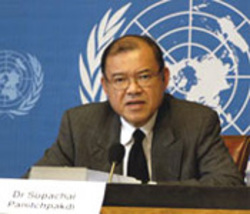UN News Service | 4 May 2011

The United Nations trade body says Ethiopia and Tanzania have made significant progress in improving their investment climate, while Rwanda, Viet Nam, Argentina and Costa Rica have taken steps to clarify and simplify government rules.
The UN Conference on Trade and Development (UNCTAD) undertakes investment policy reviews of developing and transition countries at the request of their governments and advises them on how to attract greater foreign direct investment (FDI) and spur economic development. To date, the Geneva-based agency has completed reviews for more than 30 countries.
Secretary-General Supachai Panitchpakdi told a meeting of the UNCTAD Investment, Enterprise and Development Commission yesterday that Ethiopia and Tanzania have made "significant progress" in improving their business and investment climates based on the agency's recommendations, according to a news release.
Ethiopia achieved positive results in the agriculture and leather sectors, which in turn led to improved domestic production and better environmental standards. At the same time, the Horn of Africa nation still faces major constraints in terms of basic infrastructure - such as electricity, roads and telecommunications.
Mr. Supachai lauded the Tanzanian Government's "breakthrough" in reducing the cost and time of doing business - such as in its reduction in the number of tax procedures.
He also highlighted the measures taken by Rwanda, Viet Nam, Argentina and Costa Rica to facilitate business and promote good governance, saying these efforts showed the importance of clarity and simplicity in government interactions with citizens and businesses.
Clear, simple and widely accessible rules are essential to promoting investment and encouraging the payment of taxes and social contributions, thus increasing public revenues which can enhance the capacity of States to invest in needed physical, economic and social infrastructure.
Meanwhile, UNCTAD announced today that it has finalized a set of proposed principles intended to establish clear responsibilities for borrowers and lenders of sovereign, or government, debt.
"The principles have the potential to reduce the prevalence of sovereign debt crises, maintain stable economic growth and support the achievement of the Millennium Development Goals (MDGs)," the agency stated in a news release, referring to the set of eight globally agreed targets that seek to halve world poverty by 2015 by combating hunger, disease, illiteracy, environmental degradation and discrimination against women.
Work on the proposed standards, which will be presented to governments at regional meetings to solicit their views, began at the height of the global financial and economic crisis in 2009.












